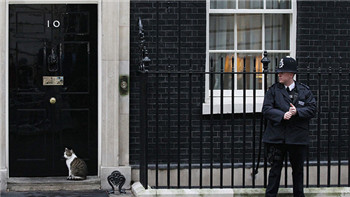(单词翻译:单击)

Twenty years ago I had lunch in London with a senior civil servant. This was at the tail-end of the decadent London lunching era and, after a lot of wine, he asked me what I thought of the minister he worked for. I said I’d interviewed the minister and he seemed a nice bloke. “The man”, said the civil servant, leaning across the table for emphasis, “is an animal!”
20年前我与一名英国高级公务员在伦敦共进午餐。那是在伦敦颓废的午餐时代行将终结的时期,在喝下不少红酒后,他问我对他所效力的那位部长的看法。我说我曾采访过那位部长,他看起来是个不错的家伙。“那个人,”这名公务员从桌子那头探身过来强调说:“是个禽兽!”
Anyone who remembers the 1980s television comedy series Yes Minister and Yes, Prime Minister knows that British civil servants and ministers are forever locked in a silent power struggle. That struggle will shape the form that Brexit ultimately takes. British voters chose Brexit; Theresa May’s new government has promised to implement it. But, in practice, civil servants will mostly sort out how exactly it is done. And these people are good at getting their way.
凡是记得80年代两部电视喜剧《是,大臣》(Yes Minister)和《是,首相》(Yes, Prime Minister)的人,都知道英国的公务员和部长级官员们永远陷入无声的权力斗争。这种斗争将塑造英国退欧的最终形式。英国选民选择了退欧;特里萨•梅(Theresa May)的新政府承诺会执行这一结果。但在实践中,主要将由公务员们决定具体该做什么。而这些人很善于达到目的。
In the first episode of Yes, Prime Minister, the new prime minister, Jim Hacker, egged on by the government’s chief scientific adviser, concocts a whizzo scheme for a conscription army. Hacker, delighted with himself, exclaims: “Why didn’t I think of this before?” and the chief scientific adviser replies: “Because we only just met.”
在《是,首相》的第一集中,新任首相Jim Hacker受政府首席科学顾问的怂恿,炮制了一个征兵入伍的绝妙方案。自以为是的Hacker感慨说:“我为什么早没想到呢?”对此首席科学顾问回答说:“因为我们才刚认识。”
That’s the relationship between civil servants and their minister in a nutshell: they know more than he does.
这句话概括了公务员和部长级官员之间的关系:他们知道的比部长多。
All of this is wonderfully explained in a surprise bestseller that appeared in Germany this year, 18 years after the death of its author, the sociologist Niklas Luhmann. Der neue Chef (“The New Boss”) is a collection of some of Luhmann’s 1960s writings on the art of what we would now call “managing up”. The book is quietly, almost silently humorous. Luhmann starts with the scenario that now faces British civil servants: the arrival of a new boss. This, says Luhmann, is “one of the few exciting events in everyday bureaucracy”.
这一切在今年德国一本意外登上畅销榜的著作中有绝妙解释,该书作者、社会学家尼克拉斯•卢曼(Niklas Luhmann)已在18年前去世。《新老板》(Der neue Chef)收集了卢曼在60年代就我们如今称为“向上管理”(managing up)艺术撰写的一些文章。该书流露出安静到几乎无声的幽默。卢曼以英国公务员如今面临的场景——即一个新老板的到来——作为开头。卢曼说,这是“官僚机构的日常生活中为数不多的令人兴奋的事情之一”。
Luhmann advises any underling feeling awed by his boss: “It is helpful to imagine that one’s superior has no clothes on.” Then, he says, the underling should realise that leaders lack time and capacity to lead: “Their attention has its limits too, their day too has only 24 hours . . . The superior would be lost if the underlings passed all problems on to the top.” Because underlings outnumber leaders, they have more decision-making capacity.
卢曼向所有对上司感到敬畏的下属建议:“设想你的上级没穿衣服,这会有所帮助。”然后,他说下属应该意识到,领导者并没有足够的时间和能力去领导:“他们的注意力也是有限度的,他们的一天也只有24个小时……如果下属把所有问题都扔给上司,上司将会晕头转向。”因为下属在人数上超过领导,所以他们有更大决策能力。
This is how British ministries traditionally function. The typical minister takes office knowing almost nothing about his ministry’s actual work. His main aim is to avoid getting into trouble either with the prime minister or — more importantly — with the tabloids. The civil servants’ aim is to make the big decisions. Chris Mullin, a Labour minister under Tony Blair, described in his 2009 memoir A View From the Foothills how this works. Every day Mullin’s private secretary would place files in his in-tray, “usually with a little handwritten note attached, boiling the issue down to a single sentence”. Each file came with the civil servants’ recommendation. “All I have to do”, wrote Mullin, “is signify agreement or disagreement by making my mark on the top of the page.” Usually, he signified agreement.
这是英国政府部门传统的运作方式。典型的部长级官员在上任时对自己部门的实际工作一无所知。他的主要目标是避免卷入与首相或小报(后者更重要)的是非。公务员们的目标是作出重大决策。曾在托尼•布莱尔(Tony Blair)的工党政府担任部长级官员的克里斯•穆林(Chris Mullin)在2009年出版的回忆录《从山麓外望》(A View from the Foothills)一书中描述了这一切是如何运作的。穆林的私人助理每天会把文件放在他的待处理文件栏中,“通常都附带一张手写的小便条,把事情浓缩成一句话”。每份文件都附带着公务员们的建议。“我所要做的,”穆林写道:“就是在文件页首标明我同意还是不同意。”通常,他都表示同意。
The new government will have to make bigger decisions than Mullin ever did. Brexit is the British civil service’s largest ever peacetime project. A bureaucracy shrunk by the Tories will now have to unpick 40 years of European law and negotiate a new relationship with the EU, while also conducting trade talks with half the world.
英国新政府要做的决定比当年穆林面临的任何决定都更重大。“退欧”将是英国公务员团队在和平时期的最大项目。在保守党执政期间缩了水的官僚机构,现在将不得不摆脱40年来英国引入的欧盟法律,与欧盟谈判建立新的关系,同时还要与半个世界展开贸易谈判。
The basic question for the UK is: what kind of Brexit do you want? Do you want to be like Norway, with full access to the European single market but no limits on European immigration? Or do you want to be more like Moldova, shut off from the single market but also from immigration? The politicians don’t want to make this choice, because the Moldova option would mean economic decline and the Norway option would upset anti-immigrant voters. Nor does May want to call a general election to clarify the choice.
英国面临的根本问题是:你想要哪种形式的退欧?是想要跟挪威一样,有欧洲单一市场的全面准入,但对欧洲移民不加限制?还是想跟摩尔多瓦一样,退出单一市场但也彻底隔绝移民?政客们不想作这个选择,因为摩尔多瓦模式将意味着经济衰退,而挪威模式则会激怒反移民的选民。首相梅也不愿提前举行大选以澄清选择。
That means that for the next few years, the Norway-or-Moldova choice will likely be made on a messy case-by-case basis by civil servants. Usually, the minister will just signify agreement.
这意味着,在未来几年中,挪威还是摩尔多瓦模式的选择,很可能会由公务员们在乱糟糟的个案基础上作出。通常情况下,部长只会表示同意。
. . .
...
Senior civil servants are educated people living in London, so they probably didn’t vote for Brexit. Indeed, Whitehall’s most powerful department, the Treasury, made a public case against it. If civil servants are left to handle the negotiations, Brexit will end up looking more like Norway than Moldova.
高级公务员是生活在伦敦的受过良好教育的人,所以他们很可能没有投票支持“退欧”。的确,白厅最强大的部门财政部曾公开反对退欧。如果让公务员们来谈判,“英国退欧”到头来会更像挪威而不是摩尔多瓦。
The civil servants’ boring decisions — for instance, on the precise legal form of any British “immigration brake” — probably won’t get much attention from Britain’s true rulers, the tabloids. As the FT’s political editor George Parker has remarked, these papers have almost no correspondents in Brussels despite their insistence that Britain is run from there. Nor is the British public very interested in granular technocratic detail, judging by the largely fact-free campaign for Brexit.
公务员们的枯燥决定(例如有关英国“移民刹车”的确切法律形式),可能不会得到英国真正的统治者——小报的太多关注。正如英国《金融时报》的政治编辑乔治•派克(George Parker)点评的那样,这些报纸在布鲁塞尔几乎没有外派记者,尽管它们坚称英国受那里遥控。从脱欧阵营基本不符事实的拉票宣传来看,英国民众对技术官僚层面的细枝末节也并不十分感兴趣。
In Yes, Prime Minister, the all-powerful civil servant Sir Humphrey ensures that Hacker’s whizzo conscription scheme never happens. Now, by executing Brexit, Sir Humphrey can take back control of his country.
在《是,首相》中,全能公务员Humphrey爵士确保了Hacker的绝妙征兵计划不会发生。现在,通过执行“退欧”,Humphrey爵士能真正收回对自己国家的掌控。


